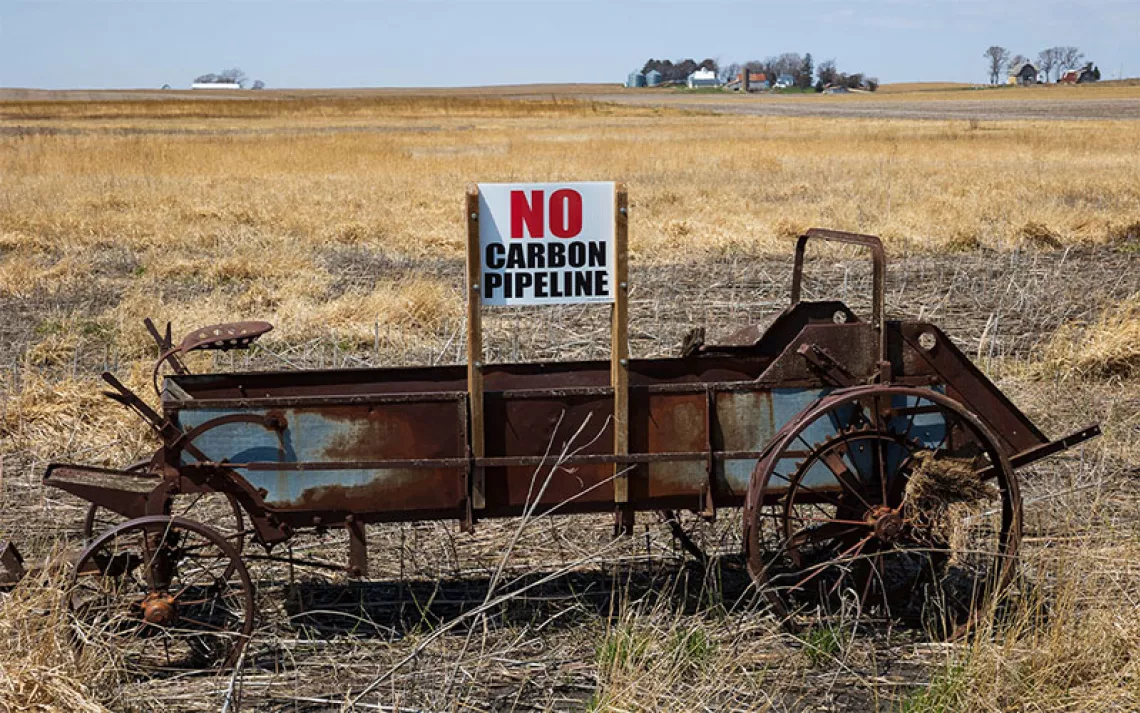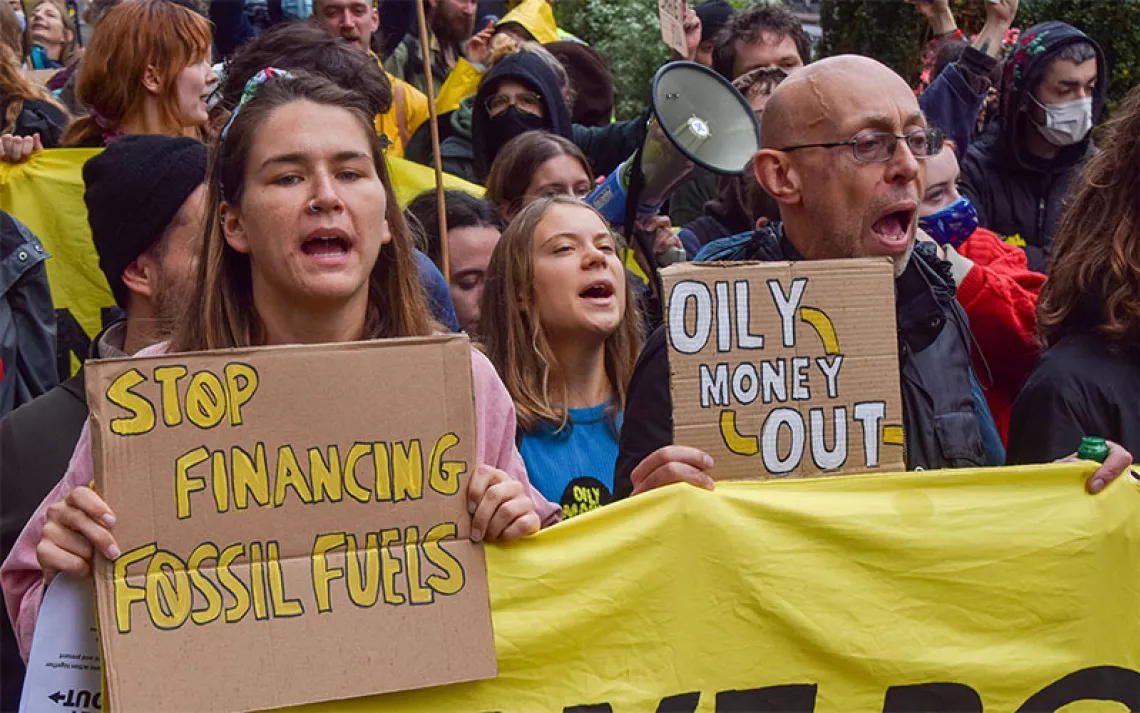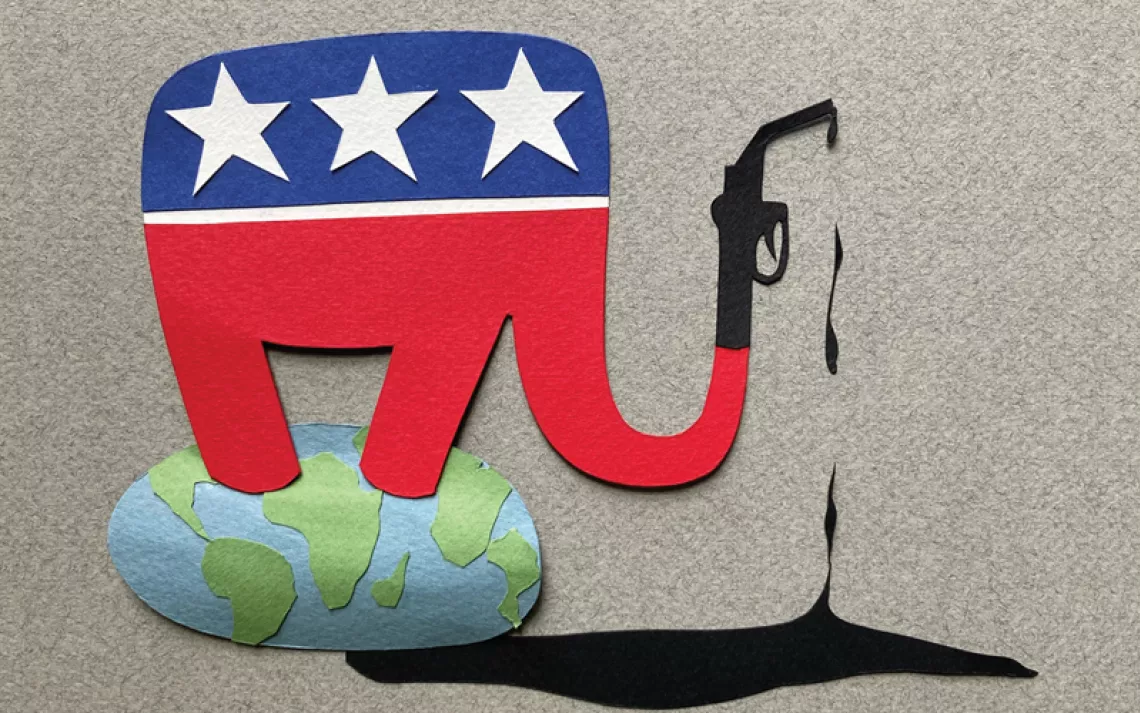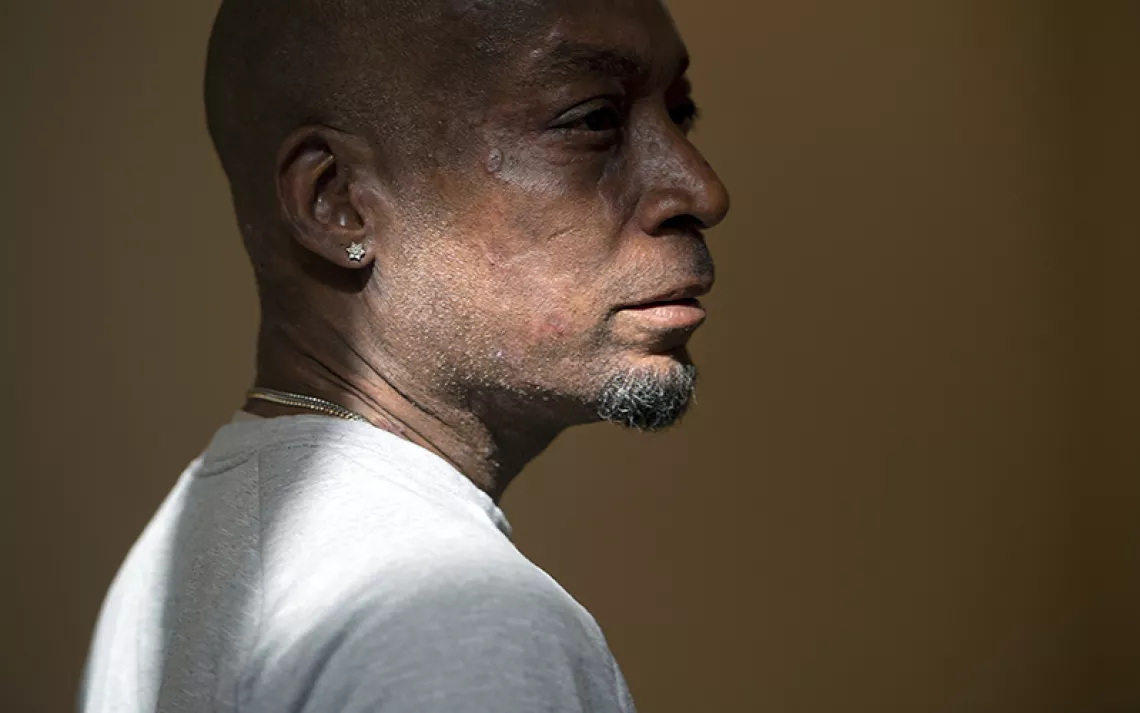Right to Vote? Wrong.
2016 is the first presidential election in 50 years during which citizens won't have the full protections of the Voting Rights Act

Illustration by David Plunkert
It's not every day that the Sierra Club marches alongside the NAACP and the AFL-CIO. On April 18, Club leaders, along with trade unionists and civil rights organizers, were arrested on the steps of the U.S. Capitol, marking only the second time in the Sierra Club's 124-year history that the organization had engaged in civil disobedience. The target of the protest wasn't a pipeline to defeat or a wilderness to defend. The 5,000 people marching on Capitol Hill were calling on Congress to protect voting rights and to reduce the influence of corporate money in the political system. Many Sierra Club members carried signs that read "Protect Our Democracy, Protect Our Environment."
"In this organization's history, we've learned that in order to protect our environment—our clean air, clean water, and wild places—we must have a fully functioning democracy," Sierra Club president Aaron Mair wrote after his arrest. "This means all eligible Americans have access to voting."
Ever since the 2010 election, when Republicans gained legislative majorities in statehouses across the country, the very cornerstone of democracy—the right to vote—has been under siege. In the last six years, 22 states have passed new voting restrictions. These include eliminating Election Day registration and requiring proof of citizenship to register, cutting early voting, and disenfranchising ex-felons. Eleven states have passed laws that require voters to present at their polling places strict forms of government-issued photo IDs that millions of Americans don't have.
In the past, the federal government served as a check against such efforts. But in 2013, the Supreme Court invalidated a key section of the 1965 Voting Rights Act, ruling that states with the worst histories of voting discrimination no longer need to have changes to their voting systems approved by the federal government. As a result, 2016 is the first presidential election in 50 years during which citizens won't have the full protections of the Voting Rights Act.
How does this relate to environmental protection? Many of the states with poor environmental records—Georgia, Texas, Wisconsin—have also passed the country's harshest voting restrictions. The country's biggest polluters, like David and Charles Koch of Koch Industries, have poured millions of dollars into these efforts in order to shape an electorate that is friendlier to pro-corporate candidates. And the very citizens who are most affected by environmental problems, particularly those in low-income and people-of-color communities, are frequently the target of voter suppression efforts.
Texas is a good example. It has the distinction of being the only state in which federal courts blocked both a new voter ID law and plans to redraw districts for Congress and the state legislature. A judge ruled that Texas's redistricting maps were "enacted with discriminatory purpose" to deny African American and Latino residents political representation. Another court found that Texas's voter ID law had "a discriminatory effect on minorities' voting rights" that could disenfranchise 600,000 voters. (Under the Texas law, a handgun permit is considered an acceptable ID but a student ID is not.)
The same politicians who championed voter suppression efforts—former and current governors Rick Perry and Greg Abbott, respectively—have zealously defended the state's oil and gas industry. Texas has long been America's biggest polluter. If it were a country, the state would rank eighth in the world in CO2 emissions, according to a 2013 study. Texas has resisted almost every new environmental regulation, suing the Obama administration—including 17 lawsuits against the EPA—more than any other state.
The black and Latino residents of Texas are most affected by the state's polluting industries. In the fracking hub of Eagle Ford, Latino residents are twice as likely to live near dirty wastewater wells. In the community of Port Arthur, public housing for African American residents is located blocks away from two massive oil refineries. African Americans in that county are 40 percent more likely than whites to die from cancer and four times as likely to suffer from respiratory conditions. Not coincidentally, such communities are passionate about environmental issues—one reason why polluter-friendly politicians want to keep them away from the ballot box.
Something similar is happening in Wisconsin, which for many years was known for protecting the environment and having one of the best election systems in the country. That all changed when Governor Scott Walker and the Republican legislature took power in 2011. Wisconsin passed one of the country's strictest voter ID laws, which could block 300,000 registered voters from casting a ballot. The state also cut early voting, shut down voter registration drives, and made it more difficult to cast absentee ballots.
Eddie Lee Holloway Jr. was among the eligible voters turned away from the polls in the state's presidential primary as a result of the new law. Holloway, a 58-year-old African American man who had moved from Illinois to Milwaukee, brought his expired Illinois photo ID, birth certificate, and Social Security card to get a photo ID for voting in Wisconsin, but his application was rejected because the name on his birth certificate read "Eddie Junior Holloway," the result of a clerical error. Holloway spent $200 on a bus ticket to Illinois to amend his birth certificate and made seven trips to different public agencies in two states, but he still couldn't get an ID to vote in Wisconsin.
Walker's agenda has been driven by Charles and David Koch, who have donated over $11 million to support his campaigns. Koch Industries has also supported the American Legislative Exchange Council, which connects corporate interests with state legislators. ALEC drafted "model" voter ID legislation that became the template for the bills in Texas and Wisconsin. With the support of the Kochs and ALEC, Walker has challenged the EPA's climate change rules, fired scientists in the Department of Natural Resources, opened wetlands to mining, and cut funding for renewable energy.
The voting restrictions and environmental rollbacks hit hardest at those most opposed to polluters' agendas. When Wisconsin Republicans discussed the voter ID law, GOP senators were "giddy" about the impact of the law "for the neighborhoods around Milwaukee," a former chief of staff to a GOP senator testified in a federal trial. Seventy percent of African Americans in Wisconsin live in Milwaukee, and the city ranks among the top 10 places in the country where industrial pollution falls disproportionately on poor and people-of-color neighborhoods.
There's a natural alliance between those who care about a healthy environment and those who care about a healthy democracy. Seventy-seven percent of African American voters and 71 percent of Latino voters "strongly" prefer clean energy investments, according to a Sierra Club survey, compared with 51 percent of Americans overall. Mair, the first black president of the Sierra Club, hopes that joining forces with diverse communities and making it easier for Americans to vote could give the environmental movement millions of new allies.
"The environment is a civil right—I think people have the right to clean air, water, and soil," Mair says. "And those rights are directly related to the right to vote."
WHAT YOU CAN DO
Defend the voting rights of all citizens. Sign a petition urging members of Congress to pass the Voting Rights Advancement Act: sc.org/votingrights.
 The Magazine of The Sierra Club
The Magazine of The Sierra Club



